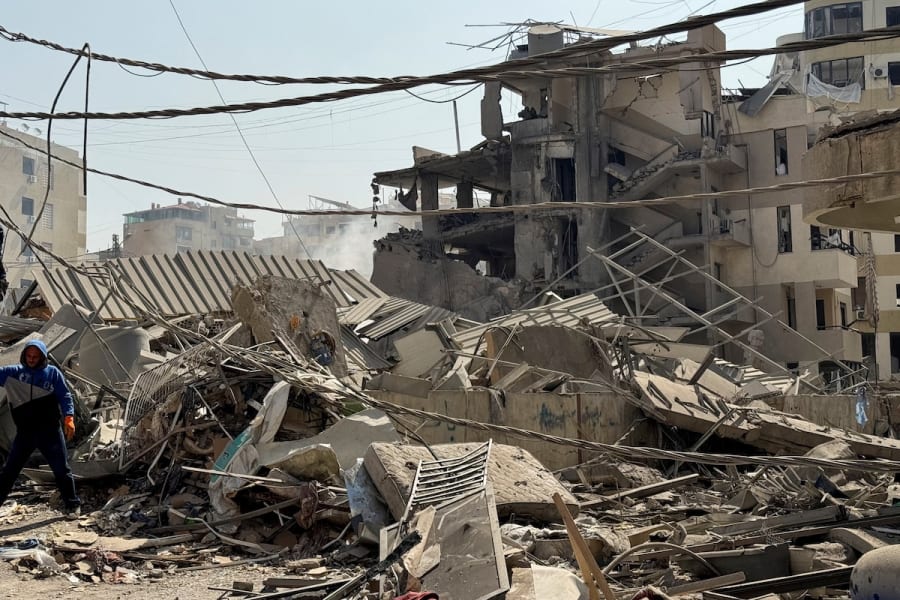Israeli Air Force strikes Hezbollah underground drone sites in Beirut & southern Lebanon
Israel holds Lebanese gov't responsible, vows ceasefire will continue to be enforced

Israel Defense Forces on Thursday night struck several underground facilities in Beirut and in southern Lebanon that the Hezbollah terror group reportedly used to manufacture drones. The strikes drew strong condemnation from the Lebanese government.
After issuing evacuation calls for several areas in Beirut, and later in the southern town of Ain Kanah, the Israeli Air Force “precisely struck drone production sites and storage facilities used by the Hezbollah Aerial Unit (127),” the IDF stated.
Lebanese President Joseph Aoun strongly condemned the “blatant violation of an international agreement,” stating it was “clear evidence of the perpetrator’s rejection of the requirements of stability, settlement and just peace in our region.”
The next morning, Defense Minister Israel Katz responded to Aoun, stressing that there would be “no peace in Beirut and no order and stability in Lebanon without security for the State of Israel. Agreements must be respected, and if you do not do what is required – we will continue to act with great force.”
Israeli airstrikes on Hezbollah's underground drone facilities continue, with at least seven strikes so far, according to eyewitnesses. Lebanese media report that the IDF used bunker-busting missiles in one of its latest strikes (not this video). https://t.co/m9lum5YUGA pic.twitter.com/FMfm4S0vWz
— Ariel Oseran أريئل أوسيران (@ariel_oseran) June 5, 2025
Prior to the attacks, Katz had emphasized that Israel holds the Lebanese government “directly responsible for preventing violations of the ceasefire and all terrorist activity against the State of Israel.”
According to the IDF, Hezbollah’s aerial unit launched over 1,000 drones toward Israel throughout the war since 2023, and continues to operate against the Jewish state despite a ceasefire agreement between Israel and the Hamas terrorist organization in Gaza.
“The unit is working to produce thousands of drones under the direction and funding of Iranian terrorists,” the IDF stated, adding, “Iran has funded and directed terrorist attacks through this project… Hezbollah terrorists travel to Iran for training in production systems, which supports the group’s ability to independently manufacture drones inside Lebanon.”
צה”ל תקף בדאחייה ובדרום לבנון אתרים תת-קרקעיים לייצור ואחסון כטב”מים וסדנה לייצור רחפנים
— צבא ההגנה לישראל (@idfonline) June 5, 2025
לפני זמן קצר, צה"ל תקף באופן ממוקד באמצעות מטוסי קרב, אתרי ייצור ומחסני כטב"מים בשימוש היחידה האווירית של ארגון הטרור חיזבאללה (127), בדאחייה שבביירות ובדרום לבנון.
היחידה האווירית הוציאה… pic.twitter.com/4CCd7obPjy
The military also stressed that the facilities in Beirut were, once again, “embedded within a densely populated civilian area.”
Before the strikes, IDF Arabic Spokesman Col. Avichay Adraee had issued evacuation orders for the areas surrounding the targets. Lebanese news outlets reported heavy traffic as residents fled the Dahiyeh neighborhood, Hezbollah’s main stronghold and the site of many of its strategic facilities.
Lebanese media reported that the Lebanese Armed Forces attempted to avert the incoming Israeli strikes by raiding the target buildings. A security source told Al Jazeera, "The Lebanese army tried to search the buildings - but Israel refused to comply with Lebanon's request to allow the searches, and insisted on starting to bomb the buildings."
Hezbollah terrorists buried UAV production sites in the heart of a civilian neighborhood in the Dahieh in Beirut, thinking they could hide it and break the rules unnoticed.
— Israel Defense Forces (@IDF) June 5, 2025
Spoiler: We found them.
And soon, they won’t be there anymore. pic.twitter.com/oGIfOMVoST
Lebanese Prime Minister Nawaf Salam also strongly condemned the strikes, which he called “a systematic and deliberate attack on our homeland, its security, stability, and economy,” and a “flagrant violation of Lebanon's sovereignty and UN Security Council Resolution 1701.”
Earlier in the day, Salam affirmed Lebanon's determination to “restore its authority over the entire national territory… and to have a monopoly on arms,” meaning the disarmament of Hezbollah.
However, he seeks to convince the terror group to give up its weapons in a negotiated political process, without directly confronting the group’s still-powerful militias.
Only in southern Lebanon – the area south of the Litani River, as stipulated in the ceasefire agreement – has the Lebanese Armed Forces (LAF) so far actively raided and dismantled Hezbollah infrastructure on a large scale.
On Thursday, Salam said that LAF had dismantled “more than 500 military positions and arms depots.”
Under the terms of the ceasefire, Hezbollah was required to withdraw all its fighters and dismantle its military infrastructure south of the Litani River. Simultaneously, the LAF was to deploy throughout the area to fill the vacuum left by Hezbollah.
Despite this, the IDF has sporadically continued to strike active Hezbollah sites, including some located south of the Litani.

The All Israel News Staff is a team of journalists in Israel.
You might also like to read this:

















